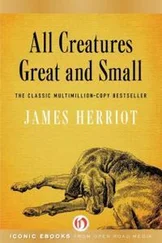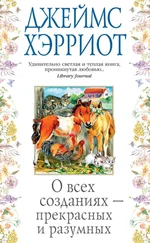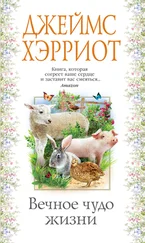Джеймс Хэрриот - All Things Bright and Beautiful
Здесь есть возможность читать онлайн «Джеймс Хэрриот - All Things Bright and Beautiful» весь текст электронной книги совершенно бесплатно (целиком полную версию без сокращений). В некоторых случаях можно слушать аудио, скачать через торрент в формате fb2 и присутствует краткое содержание. Год выпуска: 2011, ISBN: 2011, Издательство: Open Road Media, Жанр: Домашние животные, на английском языке. Описание произведения, (предисловие) а так же отзывы посетителей доступны на портале библиотеки ЛибКат.
- Название:All Things Bright and Beautiful
- Автор:
- Издательство:Open Road Media
- Жанр:
- Год:2011
- ISBN:9781453234495
- Рейтинг книги:4.5 / 5. Голосов: 2
-
Избранное:Добавить в избранное
- Отзывы:
-
Ваша оценка:
- 100
- 1
- 2
- 3
- 4
- 5
All Things Bright and Beautiful: краткое содержание, описание и аннотация
Предлагаем к чтению аннотацию, описание, краткое содержание или предисловие (зависит от того, что написал сам автор книги «All Things Bright and Beautiful»). Если вы не нашли необходимую информацию о книге — напишите в комментариях, мы постараемся отыскать её.
All Things Bright and Beautiful — читать онлайн бесплатно полную книгу (весь текст) целиком
Ниже представлен текст книги, разбитый по страницам. Система сохранения места последней прочитанной страницы, позволяет с удобством читать онлайн бесплатно книгу «All Things Bright and Beautiful», без необходимости каждый раз заново искать на чём Вы остановились. Поставьте закладку, и сможете в любой момент перейти на страницу, на которой закончили чтение.
Интервал:
Закладка:
“This is no damn good. I told Joe he had to be here before half past but he’s taken not a bit of notice. He’s always late and there doesn’t seem to be any way to get him here on time.” He took a last look out of the window at the empty street. “Right we’re not waiting any longer. You and I, James, have got that colt to cut and you, Tristan, have to see that beast of Wilson’s. So let’s be off.”
Up till then, Laurel and Hardy were the only people I had ever seen getting jammed together in doorways but there was a moment when the three of us gave a passable imitation of the famous comics as we all fought our way into the passage at the same time. Within seconds we were in the street and Tristan was roaring off in a cloud of exhaust smoke. My colleague and I proceeded almost as rapidly in the opposite direction.
At the end of Trengate we turned into the market place and I looked around in vain for signs of Mr. Mulligan. It wasn’t until we had reached the outskirts of the town that we saw him. He had just left his house and was pacing along under a moving pall of blue smoke with Clancy as always bringing up the rear.
“There he is!” Siegfried exclaimed. “Would you believe it? At the rate he’s going he’ll get to the surgery around three o’clock. Well we won’t be there and it’s his own fault.” He looked at the great curly-coated animal tripping along, a picture of health and energy. “Well, I suppose we’d have been wasting our time examining that dog in any case. There’s nothing really wrong with him.”
For a moment he paused, lost in thought, then he turned to me.
“He does look pretty lively, doesn’t he?”
5
“THEM MASTICKS,” SAID MR. Pickersgill judicially, “is a proper bugger.”
I nodded my head in agreement that his mastitis problem was indeed giving cause for concern; and reflected at the same time that while most farmers would have been content with the local word “felon” it was typical that Mr. Pickersgill should make a determined if somewhat inaccurate attempt at the scientific term.
He didn’t usually go too far off the mark—most of his efforts were near misses or bore obvious evidence of their derivation—but I could never really fathom where he got the masticks. I did know that once he fastened on to an expression it never changed; mastitis had always been “them masticks” with him and it always would be. And I knew, too, that nothing would ever stop him doggedly trying to be right. This, because Mr. Pickersgill had what he considered to be a scholastic background. He was a man of about sixty and when in his teens he had attended a two week course of instruction for agricultural workers at Leeds University. This brief glimpse of the academic life had left an indelible impression on his mind, and it was as if the intimation of something deep and true behind the facts of his everyday work had kindled a flame in him which had illumined his subsequent life.
No capped and gowned don ever looked back to his years among the spires of Oxford with more nostalgia than did Mr. Pickersgill to his fortnight at Leeds and his conversation was usually laced with references to a godlike Professor Malleson who had apparently been in charge of the course.
“Ah don’t know what to make of it,” he continued. “In ma college days I was allus told that you got a big swollen bag and dirty milk with them masticks but this must be another kind. Just little bits of flakes in the milk off and on—neither nowt nor something, but I’m right fed up with it, I’ll tell you.”
I took a sip from the cup of tea which Mrs. Pickersgill had placed in front of me on the kitchen table. “Yes, it’s very worrying the way it keeps going on and on. I’m sure there’s a definite factor behind it all—I wish I could put my finger on it.”
But in fact I had a good idea what was behind it. I had happened in at the little byre late one afternoon when Mr. Pickersgill and his daughter Olive were milking their ten cows. I had watched the two at work as they crouched under the row of roan and red backs and one thing was immediately obvious; while Olive drew the milk by almost imperceptible movements of her fingers and with a motionless wrist, her father hauled away at the teats as though he was trying to ring in the new year.
This insight coupled with the fact that it was always the cows Mr. Pickersgill milked that gave trouble was enough to convince me that the chronic mastitis was of traumatic origin.
But how to tell the farmer that he wasn’t doing his job right and that the only solution was to learn a more gentle technique or let Olive take over all the milking?
It wouldn’t be easy because Mr. Pickersgill was an impressive man. I don’t suppose he had a spare penny in the world but even as he sat there in the kitchen in his tattered, collarless flannel shirt and braces he looked, as always, like an industrial tycoon. You could imagine that massive head with its fleshy cheeks, noble brow and serene eyes looking out from the financial pages of the Times. Put him in a bowler and striped trousers and you’d have the perfect chairman of the board.
I was very chary of affronting such natural dignity and anyway, Mr. Pickersgill was fundamentally a fine stocksman. His few cows, like all the animals of that fast-dying breed of small farmer, were fat and sleek and clean. You had to look after your beasts when they were your only source of income and somehow Mr. Pickersgill had brought up a family by milk production eked out by selling a few pigs and the eggs from his wife’s fifty hens.
I could never quite work out how they did it but they lived, and they lived graciously. All the family but Olive had married and left home but there was still a rich decorum and harmony in that house. The present scene was typical. The farmer expounding gravely, Mrs. Pickersgill bustling about in the background, listening to him with quiet pride. Olive, too, was happy. Though in her late thirties, she had no fears of spinsterhood because she had been assiduously courted for fifteen years by Charlie Hudson from the Darrowby fish shop and though Charlie was not a tempestuous suitor there was nothing flighty about him and he was confidently expected to pop the question over the next ten years or so.
Mr. Pickersgill offered me another buttered scone and when I declined he cleared his throat a few times as though trying to find words. “Mr. Herriot,” he said at last, “I don’t like to tell nobody his job, but we’ve tried all your remedies for them masticks and we’ve still got trouble. Now when I studied under Professor Malleson I noted down a lot of good cures and I’d like to try this ’un. Have a look at it.”
He put his hand in his hip pocket and produced a yellowed slip of paper almost falling apart at the folds. “It’s an udder salve. Maybe if we gave the bags a good rub with it it’d do t’trick.”
I read the prescription in the fine copperplate writing. Camphor, eucalyptus, zinc oxide—a long list of the old familiar names. I couldn’t help feeling a kind of affection for them but it was tempered by a growing disillusion. I was about to say that I didn’t think rubbing anything on the udder would make the slightest difference when the farmer groaned loudly.
The action of reaching into his hip pocket had brought on a twinge of his lumbago and he sat very upright, grimacing with pain.
“This bloody old back of mine! By gaw, it does give me some stick, and doctor can’t do nowt about it. I’ve had enough pills to make me rattle but ah get no relief.”
I’m not brilliant but I do get the odd blinding flash and I had one now.
“Mr. Pickersgill,” I said solemnly, “You’ve suffered from that lumbago ever since I’ve known you and I’ve just thought of something. I believe I know how to cure it.”
Читать дальшеИнтервал:
Закладка:
Похожие книги на «All Things Bright and Beautiful»
Представляем Вашему вниманию похожие книги на «All Things Bright and Beautiful» списком для выбора. Мы отобрали схожую по названию и смыслу литературу в надежде предоставить читателям больше вариантов отыскать новые, интересные, ещё непрочитанные произведения.
Обсуждение, отзывы о книге «All Things Bright and Beautiful» и просто собственные мнения читателей. Оставьте ваши комментарии, напишите, что Вы думаете о произведении, его смысле или главных героях. Укажите что конкретно понравилось, а что нет, и почему Вы так считаете.


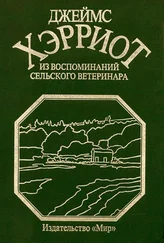
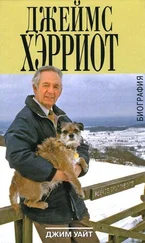
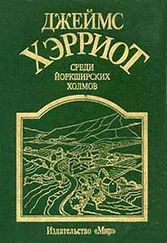
![Джеймс Хэрриот - О всех созданиях – больших и малых [litres]](/books/391169/dzhejms-herriot-o-vseh-sozdaniyah-bolshih-i-malyh-thumb.webp)


